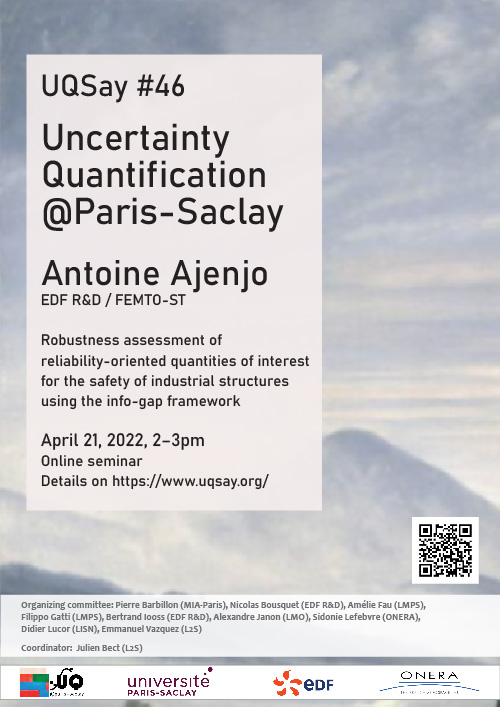The forty-sixth UQSay seminar on UQ, DACE and related topics will take place online on Thursday afternoon, April 21, 2022.
2–3 PM — Antoine Ajenjo (EDF R&D, FEMTO-ST) — [slides]
Robustness assessment of reliability-oriented quantities of interest for the safety of industrial structures using the info-gap framework
Structural reliability is of particular interest for risk-sensitive industrial applications such as power generation where system performance, and therefore safety, is subject to uncertainty. In this context, the safety is assessed by estimating reliability-oriented quantities of interest such as a low probability of failure or a high-order quantile on a specific output variable of interest. High-risk systems models are typical cases where epistemic uncertainty can be found as they often represent events that are rarely or never encountered. However, the potential impact of lack of knowledge must still be accounted for in order to make an informed decision on the safety of the system.
For this purpose, the info-gap methodology is applied to reliability quantities of interest to offer a robustness metric defined as the amount of uncertainty that a nominal model may tolerate. Such framework implies a large number of evaluations of the reliability quantity of interest. Therefore, its use requires performant reliability estimators as well as smart strategies for reducing the huge computational burden induced both by the info-gap formulation and the reliability problem.
In the first part of this presentation, info-gap robustness curves are compared with different uncertainty representations in the framework of hybrid reliability analysis and random sets. The comparison shows how representations of increasing informativeness impact the robustness evaluation of a probability of failure.
In addition, strategies are investigated to draw robustness curves efficiently. In particular, a methodology is proposed for the robustness assessment of the reliability of penstocks. Specific line sampling algorithms are constructed for estimating the probability of a failure event based on an intersection limit-state function. Moreover, deep neural networks are used to reduce the computational effort.
Joint work with Scott Cogan (FEMTO-ST), Emeline Sadoulet-Reboul (FEMTO-ST), Emmanuel Ardillon (EDF R&D), Vincent Chabridon (EDF R&D) and Bertrand Iooss (EDF R&D)
Organizing committee: Pierre Barbillon (MIA-Paris), Julien Bect (L2S), Nicolas Bousquet (EDF R&D), Amélie Fau (LMPS), Filippo Gatti (LMPS), Bertrand Iooss (EDF R&D), Alexandre Janon (LMO), Sidonie Lefebvre (ONERA), Didier Lucor (LISN), Emmanuel Vazquez (L2S).
Coordinator: Julien Bect (L2S).
Practical details: the seminar will be held online using Microsoft Teams.
If you want to attend this seminar (or any of the forthcoming online UQSay seminars), and if you do not already have access to the UQSay group on Teams, simply send an email and you will be invited. Please specify which email address the invitation must be sent to (this has to be the address associated with your Teams account).
You will find the link to the seminar on the "General" UQSay channel on Teams, approximately 15 minutes before the beginning.
The technical side of things: you can use Teams either directly from your web browser or using the "fat client", which is available for most platforms (Windows, Linux, Mac, Android & iOS). We strongly recommend the latter option whenever possible. Please give it a try before the seminar to anticipate potential problems.
